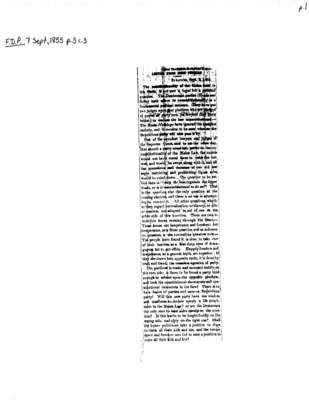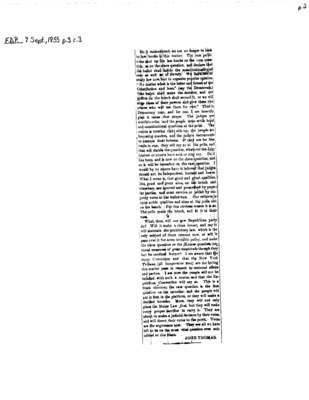Pages
D6849_Page_1
LETTER FROM JOHN THOMAS.
SYRACUSE, Sept. 3, 1855.
The unconstitutionality of the Maine Law in this State, is not now a legal but a political question. The Democratic parties (Hards and Softs) both [illegible] its uconstitutionality as a fundamental political measure. They have put two judges upon that platform who are pledged of course as party men, (as lawyers they know better) to declare the law unconstitutional.— The Know Nothings have ignored the question entirely, and it remains to be seen whether the Republican party will also pass it by.
One of the soundest lawyers and judges of the Supreme Court, said to me the other day, that should a party come into power on the unconstitutionality of the Maine Law, the courts would not have moral force to resist the torrent, and would be swept along with it, and all the precedents and decisions of our old law sages restricting and prohibiting liquor sales would be ruled down. The question to be settled then is, "may the law regulate the liquor trade, or is it unconstitutional to do so?" That is the question, and the only question at the coming election, and there is no use in attempting to conceal it. All other questions, whether they regard naturalization, or slavery, or other matters, are adopted in aid of one or the other side of this question. They are two irresistible forces running through the State.— Those forces are temperance and freedom; but temperance, as a State question and as a domestic question, is the controlling question now.— The people have found it is time to take care of their families, as a first duty, even if demagogues fail to get office. Happily freedom and temperance, as a general truth, act together. If they are draw into opposite ranks, it is done by craft and fraud, the ceaseless agencies of party.
The platform is made and mounted boldly on the rum side; is there to be found a party bold enough to mount upon the opposite platform, and look the constitutional slaveocrats and constitutional rumocrats in the face? There is to be a fusion of parties and men—a Republican party! Will this new party have the wisdom and manliness to declare openly a life attachment to the Maine Law? or are the Democrats the only ones to take sides openly on the question? Is this battle to be fought boldly on the wrong side, and slyly on the right one? Shall the liquor politicians take a position to draw to them all their kith and kin, and the temperance and freedom men fail to take a position to unite all their kith and kin?
D6849_Page_2
Be it remembered, we are no longer to look to law books in this matter. The rum politicians shut up the law books on the rum question, as on the slave question, and declare that the ballot shall decide the constitutionality of rum as well as of slavery. We have not to study law now, but to organize popular opinion. "No matter what is the letter and intent of the Constitution and laws," (say the Democrats,) "the ballot shall make the decision, and our puffets on the bench shall second it, or we will strip them of their powers and give them two others who will use them for rum." That is Democracy now, and for one, I am heartily glad it takes that shape. The judges are weathercocks, and the people must settle legal and constitutional questions at the polls. The matter is turning right side up; the people are becoming masters, and the judges instruments to execute their behests. If they are for free trade in rum, they will say so at the polls, and that will decide the question, whatever the Legislature or courts have said or may say. So it has been, and is now on the slave question, and so it will be hereafter on the rum question. I would by no means have it inferred that judges should not be independent, learned and brave. What I mean is, that good and great qualities, like good and great aims, on the bench and elsewhere, are ignored and proscribed by popular parties, and must survive or perish by majority votes at the ballot-box. Our reliance is upon noble qualities and aims at the polls, not on the bench. For this obvious reason it is so. The polls make the bench, and fit it to their uses.
What, then, will our new Republican party do? Will it make a clean breast, and say it will maintain the prohibitory law, which is the only subject of State interest now, or will it pass over it for some invisible policy, and make the slave question or the Kansas question (national measures of great magnitude though they be) its cardinal feature? I am aware that the State Committee and that the New York Tribune, (all temperance then) are for letting this matter pass in respect to national affairs and parties. I am sure the people will not be satisifed with such a course, and that the Republican Convention will say so. This is a State election; the rare question is the first question on the calendar, and the people will put it first in the platform, or they will make a decided blunder. More, they will not only place the Main Law first, but they will make every proper sacrifice to carry it. They are about to make a judicial decision by their votes, and will direct their votes to the point. Votes are the arguments now. They are all we have left to us on the most vital question ever submitted to this State.
JOHN THOMAS.

